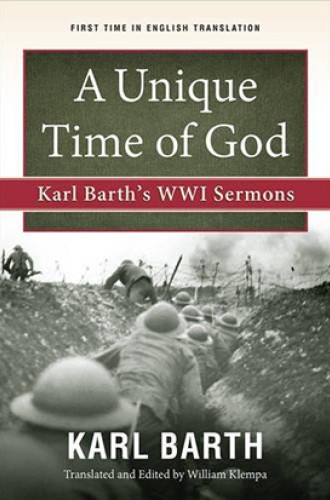How Karl Barth preached the gospel in a time of crisis
The headlines spoke of nationalism and war. Barth proclaimed a living God who calls for repentance.
Karl Barth’s well-known story concerns his move out of liberal theology—which he had learned from his teachers Adolf von Harnack and Wilhelm Herrmann—into his own formulation of a dialectical theology of crisis. By liberal theology, he meant that his teachers had committed to modern reason and accepted historical criticism—moves that eventually meant accommodating the reasoning and requirement of the state. William Klempa provides a valuable reiteration of that story firmly situated in historical context.
Barth preached 13 sermons in his village church on consecutive Sundays in the summer of 1914, as Europe was heating up for war. Klempa provides a detailed correlation between Barth’s sermons (and other literary activity) and the events of the time. He shows how Barth was at work, as he so famously urged, between the meaning of Bible and the content of the daily newspaper.
The defining preoccupation of these sermons is the outbreak of the war and the anxiety evoked in the Swiss populace sympathetic to the German cause. In the midst of that war fever, Barth critiques the war and counters it with the truth of the gospel. The primary preoccupation of the sermons is the rule of God, which simultaneously is filled with powerful grace and brings judgment. “In this war God’s judgment has come upon us.” Barth asserts that “God is not mocked,” and no doubt he saw the posturing of the European states in that moment as an act of mocking God. By staking out this claim, Barth rejects the benign accommodating God of liberal theology.
The sermons have much to say about God: “Jesus lived in the realm of the heavenly Father. He knew that the Father is not cruel . . . The Father is also not indifferent . . . And the Father is not feeble . . . God is alive.” Human persons must come to terms with the reality of this living, active God:
There are two kinds of men and women and, accordingly, two ways of relating to God’s will. The first kind of people are involuntary instruments of God. They do not know whom they serve and obey. They are simply used . . . The second kind of men and women are alert, vibrant, and joyful in God’s will. They recognize God’s will and delight in doing it.
There is, to be sure, no escape from the will and purpose of God. Yet “God’s power is certainly not that of a capricious tyrant; God’s power is God’s grace. God’s will is holy, righteous, and altogether good, even if we don’t always see God’s purposes.”
From this depiction of God, Barth summons his listeners to a different kind of prayer. Excessive preoccupation with worry and comfort is to be resisted: “Stand back from these kinds of questions and answers. Away with them! . . . For our praying then is not real praying, no matter how eagerly we besiege God with our anxious requests.”
A second theme that animates these sermons is repentance. His call to repentance is not merely a matter of disposition, however. It also has tangible ethical substance:
The Gospel says, “Give everything away in order to hold wholly to God.” In response we European people said, “We want the good life.” The Gospel says, “Love your neighbor as yourself” (Matt. 22:39). We loved money in place of our neighbor.
Whoever obeys this law cannot continue to use the possessive I and say that is my right, my honor, my property; he or she cannot continue to say, no matter whether rich or poor, this is my money and property. Thus “I” and this “my” no longer exist. This “I” and this “my” cause all the injustice and suffering in the world . . . Because of the “I” and “my” they wage war against one another.
Barth clearly sees preaching as a public act. In his little village, he boldly addresses “the Swiss” and situates his nation-state alongside other states: “We must guard immediately against being deceived by what every nation and every party now seems to think: ‘We alone are truly patriotic and enthusiastic about our duty’ or ‘we alone can be heroic and loyal.’”
Barth’s time was indeed a “unique time of God.” But Barth would surely have said that every sermon is a unique time of God. Beyond historical interest, these sermons invite reflection on preaching in our own context of crisis.






